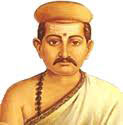Vidyapati (c 1374-1460)
 Vidyapati is as much known for his love-lyrics as for his poetries dedicated to Lord Shiva and also love songs about Sri Krisha and Radha. He used to compose in Maithili, a language spoken around Mithila (a region in the north Bihar), closely related to the abahattha form of early Bengali.
Vidyapati is as much known for his love-lyrics as for his poetries dedicated to Lord Shiva and also love songs about Sri Krisha and Radha. He used to compose in Maithili, a language spoken around Mithila (a region in the north Bihar), closely related to the abahattha form of early Bengali.
The love songs of Vidyapati, which describe the sensuous love story of Radha and Krishna, follow a long line of Vaishnav love poetry, popular in Eastern India, and include much celebrated poetry such as Jayadeva’s Gita Govinda of the 12th century. This tradition which uses the language of physical love to describe spiritual love, was a reflection of a key turn in Hinduism, initiated by Ramanuja in the 11th century which advocated an individual self realization through direct love. Similar to the reformation in Christianity, this movement empowered the common man to realize God directly, without the intervention of learned priests. Part of the transformation was also a shift to local languages as opposed to the formal Sanskrit of the religious texts.
The Maithili of these poems is also called Brajabuli, and this style of poetry became very popular in Bengal, where later poets such as Govindadas emulated this form, and even in the 19th century, Rabindranath Tagore, wrote Bhanusimher Padavali in this language.
The songs he wrote a prayers to Lord Shiva are still sung in Mithila and form a rich tradition of sweet and lovely folk songs.
Folklore says that he was such a great devotee of Lord Shiva that the lord was really pleased with him. And once He decided to come to live in his house as a servant. As the servant He is said to have taken the name Ugna. At several places in the region, Lord Shiva is still worshipped by this name. This incident is supposed to symbolize the traditional Indian saying that “Gods are slaves to their devotees”.
Vidyapati Poems
- Counterfeit
- For Heaven’s Sake
- He Promised he’d return
- Thinner Than The Crescent
- Time and Love
- Tommorow
Related
